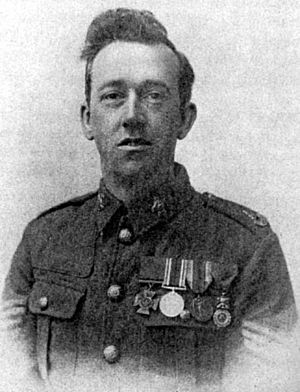William Henry Johnson (VC) facts for kids
Quick facts for kids
William Henry Johnson
|
|
|---|---|
 |
|
| Born | 15 October 1890 Worksop, Nottinghamshire |
| Died | 25 April 1945 (aged 54) Arnold, Nottinghamshire |
| Buried |
Redhill Cemetery
|
| Allegiance | |
| Service/ |
|
| Rank | Sergeant |
| Unit |
|
| Battles/wars |
|
| Awards |
|
William Henry Johnson (born October 15, 1890 – died April 25, 1945) was an English soldier. He received the Victoria Cross, which is the highest award for bravery given to British and Commonwealth soldiers.
He earned this special award for a very brave act he did on October 3, 1918. This happened in a place called Ramicourt, France, during World War I. At the time, he was 27 years old.
Contents
A Heroic Act in World War I
William Henry Johnson was a sergeant in the 1/5th Battalion of The Sherwood Foresters (The Nottinghamshire and Derbyshire Regiment). This was a part of the British Army during the First World War.
What is the Victoria Cross?
The Victoria Cross (VC) is the highest award for bravery in the British military. It is given to soldiers who show amazing courage when facing the enemy. It is a very rare and respected medal.
His Bravery at Ramicourt
On October 3, 1918, Sergeant Johnson's group of soldiers, called a platoon, was stopped. They were facing enemy machine guns that were firing at them from very close by.
Sergeant Johnson bravely moved forward by himself under heavy fire. He then attacked the enemy machine gun spot alone. He used his bayonet (a knife attached to a rifle) against several enemy gunners. He managed to capture two machine guns.
During this attack, he was badly hurt by an enemy bomb. But even though he was injured, he kept leading his men forward.
Soon after, his group was stopped again by more machine guns. Once more, Sergeant Johnson rushed forward and attacked the enemy position by himself. With incredible courage, he threw bombs at the enemy soldiers. He put their guns out of action and captured the enemy teams.
His actions that day showed amazing bravery and dedication to his duty. Because of this, he was given the Victoria Cross.
He also received another award for his bravery, the French Médaille militaire.
Later Life
During World War II, William Henry Johnson joined the Home Guard. This was a group of volunteers who protected Britain during the war. However, he later had to leave the Home Guard because he became unwell.
His Medal
William Henry Johnson's Victoria Cross medal is now on display. You can see it at the Sherwood Foresters Museum in Nottingham Castle, England.

